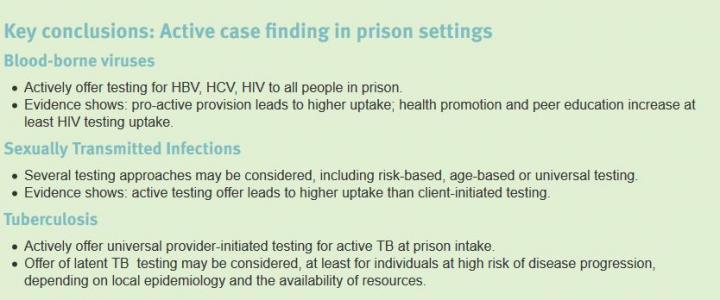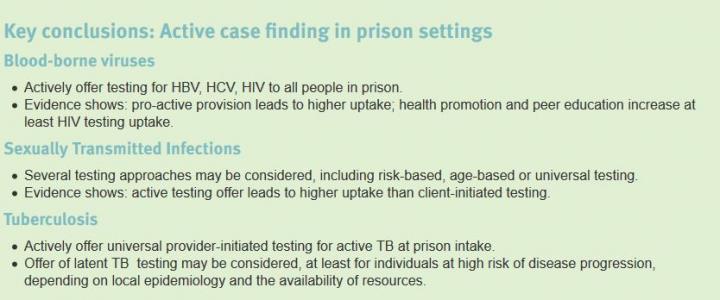
Credit: ECDC/EMCDDA
What are the most (cost-) effective ways to prevent and control communicable diseases in prison settings? In their Guidance ECDC and the European Monitoring Centre for Drugs and Drug Addiction (EMCDDA), present the evidence on active case finding as key measure to diagnose communicable diseases early. The two agencies advise to actively offer testing for hepatitis B and C and HIV to all people in prison and to conduct universal testing for tuberculosis at prison entry.
The Guidance provides scientific advice on different options for active case finding among people in prison in order to diagnose a range of communicable diseases early. For this, ECDC and the EMCDDA systematically retrieved and assessed the evidence on the effectiveness of active case finding interventions for blood-borne viruses, sexually transmitted infections and tuberculosis in prison settings in the European Union and European Economic Area.
Interrupting transmission with test-and-treat approach
Compared to the general public, people in prison have a higher burden of communicable diseases such as hepatitis B (HBV), hepatitis C (HCV) and HIV, syphilis, gonorrhoea, chlamydia and tuberculosis (TB). This constitutes a health risk for those living, and working, in prison settings as well as for the general population, given that the majority of people in prisons return to their communities after a short period of incarceration (median length of detention in Europe is less than nine months).
The ECDC-EMCDDA Guidance is based on consultations with a panel of prison experts, and identifies the most (cost-) effective approaches with the aim to interrupt transmission in, and between, prison settings as well as the community, by first testing and then offering treatment to those infected.
Diagnosing infectious diseases in the prison population is challenged by several factors such as the silent nature of many chronic infections, particularly in early stages of infection, limited health literacy and reticent health-seeking behaviour. Suboptimal access to care in prison settings adds to the problem. According to the principle of equivalence of care, people in prison should enjoy an equivalent standard of care as in the community. Yet, their health needs tend to be greater.
Accordingly, recent epidemiological data show that among people with a positive diagnostic test in prison, sizeable proportions were unaware of their status:
- 53% of those HBV positive were unaware of their infection;
- 44% of those with latent TB infection;
- 12% of those HCV positive;
- 3% of those who were HIV positive.
The high percentage of people in prison who are not aware of their health status in turn increases the risk for further transmission. Developing an accurate epidemiologic overview of infectious diseases in prison settings is therefore vital for public health and healthcare planning purposes.
Following on from the principles for HIV testing services outlined by the World Health Organization, the ECDC-EMCDDA Guidance provides the following seven principles as the foundation of active case finding approaches, both in prison settings and in the community:
- consent,
- confidentiality,
- counselling (or communication),
- correct test results,
- connection to prevention, care, and treatment
- continuity of care post-release and
- an overall supportive culture within the prison system
While there is no clear indication on the most effective timing and modality for active case finding of sexually transmitted infections, and different testing approaches (risk-based, age-based or universal testing) may all be used in prison settings, the existing evidence shows that an active STI testing offer leads to higher uptake than client-initiated testing.
###
ECDC and the EMCDDA welcome the efforts of European HIV-Hepatitis Testing Week to increase positive dialogue among those who might benefit from being tested and those who offer tests across Europe. The first Spring edition of European Testing Week is currently underway (18 to 25 May 2018).
Read the ECDC-EMCDDA Guidance: http://bit.ly/ACF_18
More information:
ECDC-EMCDDA: Systematic review on active case finding of communicable diseases in prison settings https://ecdc.europa.eu/en/publications-data/systematic-review-active-case-finding-communicable-diseases-prison-settings
Systematic review on the diagnosis, treatment, care and prevention of tuberculosis in prison settings https://ecdc.europa.eu/en/publications-data/systematic-review-diagnosis-treatment-care-and-prevention-tuberculosis-prison
Cost-effectiveness analysis of programmatic screening strategies for latent tuberculosis infection in the EU/EEA https://ecdc.europa.eu/en/publications-data/cost-effectiveness-analysis-programmatic-screening-strategies-latent-tuberculosis
Media Contact
ECDC press office
[email protected]
46-858-601-678
@ECDC_EU
http://ecdc.europa.eu
Original Source
https://ecdc.europa.eu/en/news-events/ecdc-and-emcdda-make-case-active-case-finding-communicable-diseases-prison





